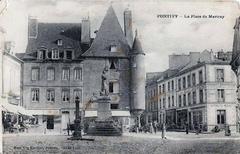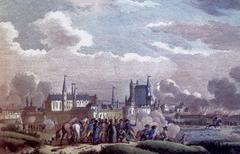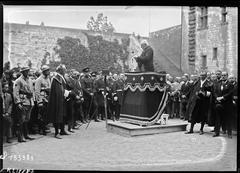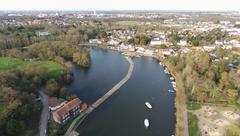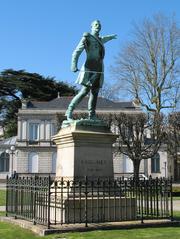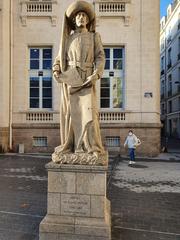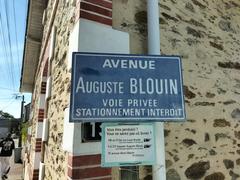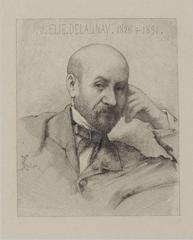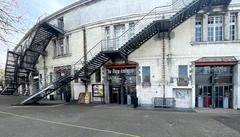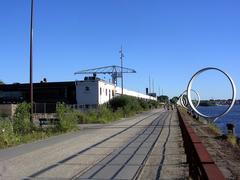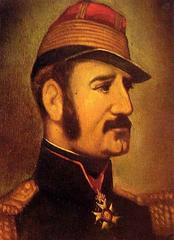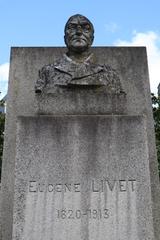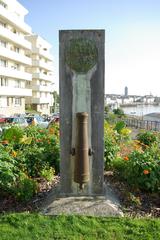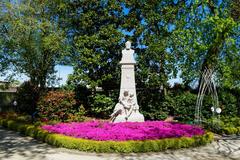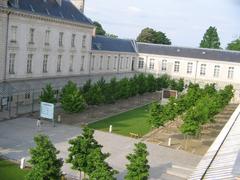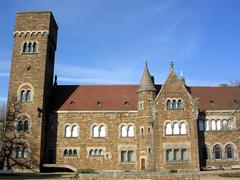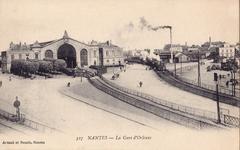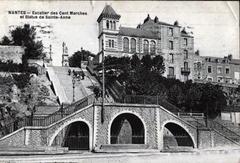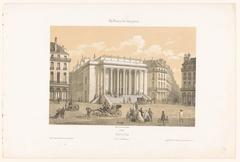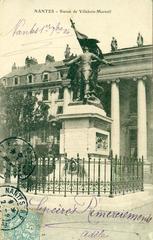Basilique Saint-Nicolas Nantes: Visiting Hours, Tickets & Historical Sites Guide
Date: 04/07/2025
Introduction
The Basilique Saint-Nicolas in Nantes is a stunning neo-Gothic monument that encapsulates the city’s spiritual, architectural, and historical heritage. Whether you are an avid historian, an architecture lover, or a traveler making your way through Nantes’ cultural landmarks, this basilica offers a journey through centuries of faith and artistic ambition. Built on the site of an 11th-century chapel, the basilica stands today as a symbol of Nantes’ maritime identity and community resilience, having survived wartime devastation and benefitted from meticulous restoration. This guide provides essential visitor information—including opening hours, tickets, accessibility, and travel tips—while exploring the basilica’s architectural highlights, historical significance, and nearby attractions. (France-Voyage; World City Trail; Wikipedia)
Table of Contents
- Introduction
- Medieval Origins and Early Development
- 19th-Century Neo-Gothic Transformation
- Consecration and Basilica Status
- Architectural and Artistic Highlights
- War Damage and Restoration
- Heritage Protection and Archaeology
- Visiting Hours, Tickets & Accessibility
- Travel Tips and Nearby Attractions
- Frequently Asked Questions
- Conclusion
Medieval Origins and Early Development
The Basilique Saint-Nicolas stands on a site of worship dating back to the 11th century, initially serving the Saint-Nicolas district as a modest chapel. Over the centuries, the structure evolved, with major expansions in the 15th and 18th centuries. By then, it featured three naves, a flat chevet, and a grand portal, reflecting its status as a significant parish church in the city (France-Voyage).
19th-Century Neo-Gothic Transformation
By the 19th century, population growth and urban development rendered the old church insufficient. Abbé Félix Fournier, later Bishop of Nantes, spearheaded the construction of a new, larger edifice in the popular neo-Gothic style. Architect Jean-Baptiste Lassus designed the basilica, adapting to the irregular urban plot with a north-south orientation—unusual for Christian churches. Construction took place in three phases from 1844 to 1869, using regional granite and tuffeau stone. The basilica’s 100-meter bell tower became a defining feature of Nantes’ skyline (MusicaMeFrance; Wikipedia).
Consecration and Basilica Status
The basilica was consecrated on October 10, 1876. In 1882, Pope Leo XIII elevated it to the rank of minor basilica, highlighting its religious and architectural significance. This distinction reinforced its role as a center for major Catholic celebrations in Nantes (MusicaMeFrance; Wikipedia).
Architectural and Artistic Highlights
The Basilique Saint-Nicolas is a prime example of neo-Gothic architecture. Its spire rises 100 meters, set upon a polygonal tower and square base, exemplifying both technical prowess and spiritual aspiration. The basilica measures 86 meters in length and 32 meters in width, with vaulted ceilings soaring to 24 meters.
The south façade is adorned with a grand portal and tympanum, featuring a statue of Saint Nicholas inspired by Mgr Fournier. The nave, choir, and transept are illuminated by stained glass windows, with the apse and upper choir featuring masterpieces crafted by Rocher in 1960. The basilica also boasts two organs: a gallery organ restored by Bernard Hurvy and a choir organ by Louis Debierre—both central to the basilica’s liturgical and musical life (France-Voyage).
War Damage and Restoration
During World War II, the basilica sustained significant damage from an Allied bombing raid in 1943. Restoration efforts began in 1953 and continued through 1974, repairing structural and artistic elements. Environmental factors necessitated another wave of restoration starting in 1996, focusing on cleaning and conserving stonework, stained glass, and sculptures (MusicaMeFrance; France-Voyage).
Heritage Protection and Archaeology
In 1985, the basilica’s neo-Gothic furnishings were registered as a monument historique, followed by the church itself in 1986 (Wikipedia). Archaeological excavations in 2017 revealed remnants of medieval houses around the basilica, further illuminating Nantes’ urban history (MusicaMeFrance).
Visiting Hours, Tickets & Accessibility
- Opening Hours: Daily, 9:00 AM–12:00 PM and 2:00 PM–6:00 PM. Hours may vary on holidays and for special events—check the official tourism website before visiting.
- Tickets: Entry is free; donations are appreciated to support maintenance and restoration.
- Guided Tours: Available on weekends and by appointment, offering in-depth historical and artistic insights.
- Accessibility: Wheelchair accessible with ramps and adapted restrooms. Assistance available upon request.
Travel Tips and Nearby Attractions
- Best Time to Visit: Mornings for optimal light and fewer crowds.
- Photography: South façade and stained glass windows are especially photogenic; morning light enhances exterior details.
- Nearby Sites: Château des ducs de Bretagne, Nantes Cathedral (Cathédrale Saint-Pierre-et-Saint-Paul), Passage Pommeraye, and the Machines of the Isle of Nantes are all within easy reach.
- Transport: Centrally located, accessible by tram (stop: Commerce) and car, with public parking nearby.
Frequently Asked Questions
Q: What are the visiting hours?
A: Daily, 9:00 AM–12:00 PM and 2:00 PM–6:00 PM. Check official sources for updates.
Q: Is there an entrance fee?
A: No, entry is free. Donations are welcomed.
Q: Are guided tours available?
A: Yes, on weekends and by appointment.
Q: Is the basilica wheelchair accessible?
A: Yes, with ramps and accessible restrooms.
Q: Can I attend concerts or special events?
A: Yes, regular organ concerts and cultural events are hosted throughout the year.
Q: Is photography allowed?
A: Yes, but visitors should be respectful, especially during services.
Conclusion
The Basilique Saint-Nicolas is a living testament to Nantes’ faith, resilience, and artistic ambition. Its neo-Gothic grandeur, storied history, and vibrant cultural life make it an essential stop for anyone exploring Nantes’ historical sites. Whether you seek spiritual reflection, architectural inspiration, or a deep dive into local heritage, the basilica welcomes you with open doors and a rich program of events and tours. Plan your visit to align with opening hours, take advantage of guided tours, and explore the wealth of nearby attractions to fully experience Nantes’ dynamic spirit.
For the latest information on visiting hours, events, and guided tours, consult the official Nantes tourism website or trusted travel platforms.
Visuals & Media Suggestions:
- High-resolution images of the exterior façade, spire, and stained glass windows (with alt tags such as “Basilique Saint-Nicolas Nantes façade” and “Stained glass windows inside Basilique Saint-Nicolas”).
- Interactive map of the basilica’s location.
- Links to virtual tours, if available.
Internal Links:
- Nantes Cathedral (Cathédrale Saint-Pierre-et-Saint-Paul)
- Château des ducs de Bretagne: History and Visit Guide
- Guide to Nantes Historical Sites
References
- Basilique Saint-Nicolas, Nantes, 2025, France-Voyage (France-Voyage)
- Basilique Saint-Nicolas in Nantes, 2025, MusicaMeFrance (MusicaMeFrance)
- Basilica of Saint Nicholas, Nantes, 2025, Wikipedia (Wikipedia)
- Basilique Saint-Nicolas in Nantes, 2025, World City Trail (World City Trail)
- Visiting the Basilique Saint-Nicolas, Nantes, 2025, France-Voyage (France-Voyage)
- Triphobo Guide
- Official Nantes Tourism Website
